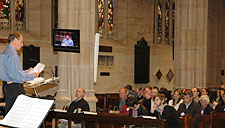William Taylor is not known as someone who sugar coats the truth. The former military officer delivered a wake-up call to the crowds at CMS Summer school two years ago and did the same for clergy last week at St Andrew’s Cathedral in warning against the search for a ministry ‘silver bullet’. The gathering was the annual ‘Ministry Intensive’ run by Ministry Training and Development (MT&D). Drawing one of North America’s key evangelical leaders, Mark Dever and Taylor, who is one of Britain’s, the crowds at this years ‘Ministry Intensive’ proved the event has come of age and established itself on the ministry calendar.

Participants from as far away as Tasmania spent two days in the Cathedral thinking, praying and receiving direct input from two of the Evangelical world’s foremost preachers and teachers. “Both spoke clearly and helpfully about the ministry of the Word of God and our need to prayerfully and lovingly preach that Word” says the Director of MT&D, Dean Phillip Jensen. “As for the silver bullet, there is no quick and easy solution for caring for God’s people.” This was backed up by Moore College Principal John Woodhouse who told sydneyanglicans.net “Every ten years some outstanding leader or spectacular ministry comes to us (usually from across the Pacific!). We are tempted to think that this "silver bullet' is suddenly going to make Christian ministry fruitful, our preaching powerful, fill our churches and impact the community and so on. We must come to terms with the fact that the silver bullet in gospel work is hard toil, often frustrating and disappointing and very rarely spectacular. The gospel servant suffers because it is the Gospel of the Suffering Servant.”
Dr Woodhouse said the latest silver bullet seems to be the ministries of the so-called Reformed Charismatics. “These brothers fall into two broad groups, which are different and must be understood differently. There are those who have come from a reformed background who have been attracted to charistmatic experience (perhaps in terms of God's guidance) and those with a charismatic background who have discovered reformed theology (particularly God's sovereignty in salvation). The two movement directions are very different, and have peculiarly north American elements. Reformed theology in America is usually "cessasionist' with regard to gifts and miracles. Charismatic theology is (obviously) "continuationist.' In the north American scene a reformed Christian who abandons cessasionism is likely to be described as "Reformed Charismatic'. Here in Sydney, however, reformed evangelicals have generally been neither cessasationist nor continuationist. We do not believe a theology that limits what God may do today, but neither do we believe that the miracles of Bible times must or should be occurring today. Our job is neither to deny nor to demand the miraculous, but to get on with faithful obedience to God, who will do what he has promised and more.”



























